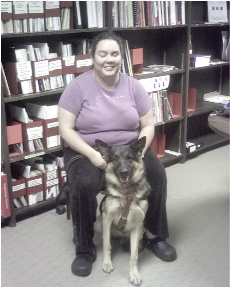For thousands of years
humans have been using
dogs of all breeds for different
jobs. One of the
more popular uses is for
guidance. Seeing Eye dogs
help their disabled owners
in many ways. Bucks has
had several students with
guide dogs.
This semester the college
welcomes student Marsha
Drenth and her Seeing Eye
dog, Emma. Drenth uses
Emma to find her classrooms,
ascertain when
there are stairs, find the
elevators, and much more.
Unfortunately the response
she is receiving from other
students is not the most
understanding. It seems
people are unaware of how
to act around a disabled
person and their guide dog.
Recently Drenth was
walking toward Founders
Hall and a young man
started to “make whistling
and kissing noises towards
Emma.” Drenth politely
said, “Can you please stop,
she’s a working dog.” The
man did not stop and after
more words finally walked
away in a huff, calling
Drenth a very inappropriate
name.
Marie Cooper, director of
Disability Services at
Bucks, wants to get the
message of guide dog etiquette
out to the student
body.
When you encounter a
guide dog, never pet the
animal without first asking
permission from its owner.
If the answer is “no” there
is a good reason, and you
must respect it.
Do not feed, whistle, talk
to or make noises toward
the dog. Doing so can
throw him off from the job
he is doing. When this happens,
the owner can be put
into a dangerous situation.
Also, make sure to keep
your pets away from the
guide dog, as other animals
can be very distracting. As
Drenth says, “I need my
dog for a reason; she’s not
just a pet.”
They are raised to do the
very important
job of
assisting
their owner
in all tasks
needed. Act
as if the
dog is not
there,
unless
instructed
otherwise
by the animals’
owner.
There is
nothing to
fear from
these dogs.
They are
highly
trained and under control at
all times.
There is also a proper
way to conduct your-self
when meeting someone
with a disability.
“People don’t know how
to approach me,” says
Drenth. “I’m a normal person
doing normal things. I
don’t bite.”
When you approach,
make sure to talk directly
to the person and address
them by name so they
know you are speaking to
them.
Feel free to use words such
as, see, look, watching and
more. Blind people use
these words all the time.
And remember not to stare;
believe it or not staring can
be felt. They are people,
the same as you and I. Like
Drenth says, “Just because
my eyes don’t work doesn’t
mean my brain doesn’t
work.”
Drenth travels frequently,
goes to school, takes
walks, shops, goes out for
dinner, and spends a lot of
time outdoors. She says
that, “Emma has a personality
like me. Dedicated to
her job, ready to go and
enthusiastic.”
People without disabilities
need to remember to be
respectful of those who
have them.
When you are in the restroom,
if there are other
stalls available, do not take
the handicapped stall. It’s
called handicapped for a
reason. Drenth has frequently
had to “wait for a
handicap stall.” That can
make a huge difference in
the amount of time she
takes between classes. I f
you have any questions
about Disability Services at
Bucks, you can reach
Cooper at
[email protected] or at
968-8463. Her office is
located in Rollins14 on the
Newtown campus.
Here is Marsha and Emma
Guide dog etiquette
ELIZABETH HECKENBERGER
•
November 15, 2010


